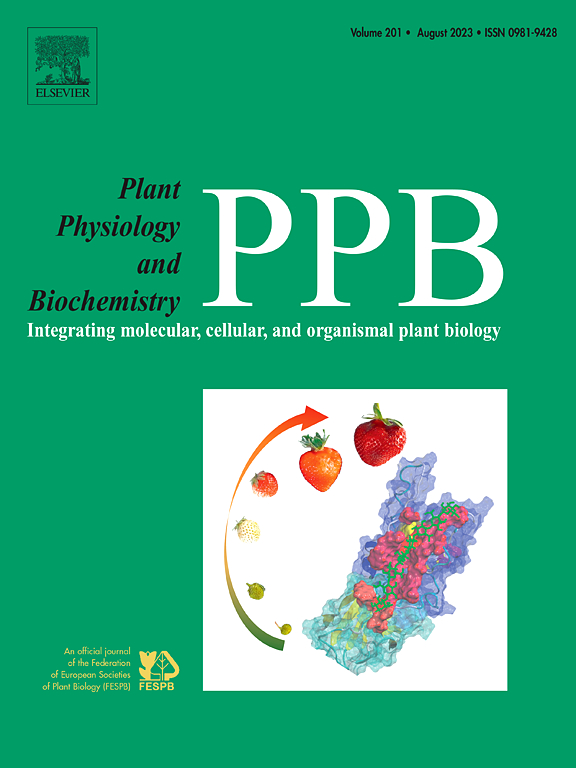Galactinol synthase 4 influences plant height by affecting phenylpropanoid metabolism and the balance of soluble carbohydrates in tomato
IF 6.1
2区 生物学
Q1 PLANT SCIENCES
引用次数: 0
Abstract
Plant height is a key trait that significantly influences plant architecture, disease resistance, adaptability to mechanical cultivation, and overall economic yield. Galactinol synthase (GolS) is a crucial enzyme involved in the biosynthesis of raffinose family oligosaccharides (RFOs). It plays a significant role in carbohydrate transport and storage, combating abiotic and biotic stresses, and regulating plant growth and development. The present study employed CRISPR/Cas9 gene-editing technology to create the gols4 mutant in tomato (Solanum lycopersicum), which exhibits a semi-dwarf phenotype. Results showed that glucose, sucrose, myo-inositol, galactinol, and raffinose levels were significantly reduced in the slgols4 mutant, impairing material transport and affecting the balance of soluble carbohydrates. Integration of transcriptomics and metabolomics data indicated not only a decrease in the expression of synthesis genes related to phenylpropanoid biosynthesis but also a significant reduction in the content of lignin and flavonoids, which are byproducts of phenylpropanoid metabolism. This may be a key factor contributing to dwarfism. Overall, these findings provide evidence for the role of SlGolS4 in regulating sugar metabolism and phenylpropanoid metabolism, offering new insights into tomato dwarfing cultivation and germplasm resources.
半乳糖醇合成酶4通过影响番茄苯丙素代谢和可溶性碳水化合物平衡影响株高。
株高是影响植株形态、抗病性、机械栽培适应性和整体经济产量的关键性状。半乳糖醇合成酶(GolS)是参与棉子糖家族寡糖(RFOs)生物合成的关键酶。它在碳水化合物运输和储存、抵抗非生物和生物胁迫以及调节植物生长发育中起着重要作用。本研究利用CRISPR/Cas9基因编辑技术在番茄(Solanum lycopersicum)中构建了gols4突变体,该突变体表现为半矮化表型。结果表明,slgols4突变体中葡萄糖、蔗糖、肌醇、半乳糖醇和棉子糖水平显著降低,物质运输受损,可溶性碳水化合物平衡受到影响。转录组学和代谢组学数据的整合表明,不仅与苯丙烷生物合成相关的合成基因的表达减少,而且苯丙烷代谢副产物木质素和黄酮类化合物的含量也显著降低。这可能是导致侏儒症的一个关键因素。综上所述,这些发现为SlGolS4在调节糖代谢和苯丙素代谢中的作用提供了证据,为番茄矮化栽培和种质资源开发提供了新的思路。
本文章由计算机程序翻译,如有差异,请以英文原文为准。
求助全文
约1分钟内获得全文
求助全文
来源期刊
CiteScore
11.10
自引率
3.10%
发文量
410
审稿时长
33 days
期刊介绍:
Plant Physiology and Biochemistry publishes original theoretical, experimental and technical contributions in the various fields of plant physiology (biochemistry, physiology, structure, genetics, plant-microbe interactions, etc.) at diverse levels of integration (molecular, subcellular, cellular, organ, whole plant, environmental). Opinions expressed in the journal are the sole responsibility of the authors and publication does not imply the editors'' agreement.
Manuscripts describing molecular-genetic and/or gene expression data that are not integrated with biochemical analysis and/or actual measurements of plant physiological processes are not suitable for PPB. Also "Omics" studies (transcriptomics, proteomics, metabolomics, etc.) reporting descriptive analysis without an element of functional validation assays, will not be considered. Similarly, applied agronomic or phytochemical studies that generate no new, fundamental insights in plant physiological and/or biochemical processes are not suitable for publication in PPB.
Plant Physiology and Biochemistry publishes several types of articles: Reviews, Papers and Short Papers. Articles for Reviews are either invited by the editor or proposed by the authors for the editor''s prior agreement. Reviews should not exceed 40 typewritten pages and Short Papers no more than approximately 8 typewritten pages. The fundamental character of Plant Physiology and Biochemistry remains that of a journal for original results.

 求助内容:
求助内容: 应助结果提醒方式:
应助结果提醒方式:


